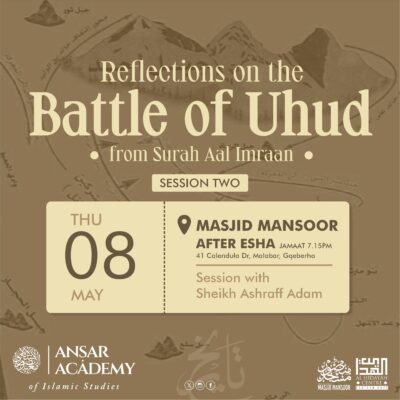As Muslims we claim to love Allah Ta’ala and His Messenger sallallahu alaihi wa sallam. There needs to be some form of verification of that claim. It is, “If you love Allah, then follow me.” Following the lifestyle of the Prophet sallallahu alaihi wa sallam is proof that we are true in our claim.
The Sunnah is not restricted to acts of worship but is an all-encompassing package. The social interaction from the Sunnah is most sublime and should be adopted by us.
Life has difficult moments. In those dark times, your kindness in bringing a little joy and happiness to the person can have a profound effect. Ka’b bin Malik radhiallahu anhu was one of the Sahaba who had not participated in an expedition with the Prophet sallallahu alaihi wa sallam. He had no valid excuse for not participating and presented this to the Prophet sallallahu alaihi wa sallam. He was going through a trying time, awaiting the decision of Allah Ta’ala, ostracized by the community. When it comes, the scene plays out vividly:
“When I had offered the Fajr prayer on the 50th morning on the roof of one of our houses and while I was sitting in the condition which Allah Ta’ala described (in the Quran) i.e. my very soul seemed straitened to me and even the earth seemed narrow to me for all its spaciousness, there I heard the voice of one who had ascended the mountain of Sala calling with his loudest voice, O Ka’b bin Malik! Be happy (by receiving good tidings).”
We take a moment here to reflect on a lesson from this incident.
Ka’b radhiallahu anhu says that he heard someone calling with his loudest voice. The caller’s voice was not raised in search of a livelihood through selling some goods in the marketplace, nor was it a call for help. In fact, his calling and rushing to inform Ka’b radhiallahu anhu of the good news was nothing but a reflection of the pure hearts and selfless character of the Sahaba. It is an example of their hastening towards good, more specifically, in fulfillment of the teaching to give glad tidings and bringing joy and happiness to other Muslims. Sharing in the achievements and successes of others is part of being a Muslim.
Benefiting others
- “The most beloved of people according to Allah is he who brings most benefit, and the most beloved of deeds according to Allah the Mighty, the Magnificent, is that you bring happiness to a fellow Muslim, or relieve him of distress, or pay off his debt or stave away hunger from him.” (Tabarani)
- Anas radhiallahu anhu reports that the Prophet sallallahu alaihi wa sallam said, “Whoever does for his brother what pleases him, solely to bring him joy, Allah will bring joy to him on the day of Qiyamah.” (Al Mujam al Saghir, Hadith: 1178)
- Other narrations have labelled bringing joy to another person as: “The most virtuous of deeds” and “A sure means of forgiveness.” (Tabarani; Targhib, Hadith: 3878/9)
- When we find that a certain matter will bring joy to another Muslim, be it good news or success, we should rush to deliver this source of happiness to him and share in his joy. On the contrary, hiding the good that we see or hear about our fellow Muslims is a characteristic of those who carry envy and jealousy in their hearts; they hide the good yet are quick to spread the bad. For the true believer, the joy of his brother is his own.
- The fact that this act of bringing good news to others was one performed by the angels clearly points to its elevated status. Allah Ta’ala says regarding the angels, when they came to give Ebrahim alaihis salaam the good news of a son, Ishaq alaihis salaam, “(The angels) said, ‘Do not fear. We give you good news of a learned boy.” (Noble Quran 15:53)
- With the right intention, the act of giving good news to Muslims becomes one of worship. Beyond the obligations of prayer, fasting, Hajj and zakah, we are blessed with many gates of good that lead to Allah Ta’ala’s pleasure. The gate of bringing joy to others opens to several doors. Here are some examples from the Seerah:
Give gifts
- It could have been of little monetary value, but most of us can recall a gift that touched us deep down. Gift giving is even a source of joy for the giver, whose pleasure increases when they see the pleasant reaction of the one who received it. Don’t let those close to us have to always assume that we love them. Express that love and reassure them of it by giving something tangible.
- The Prophet sallallahu alaihi wa sallam encouraged the giving of gifts, “Exchange gifts, as that will lead to increasing your love for one another. (al Adab al Mufrad 594)
A good word
- Saying a few simple words, sweet in nature, will result in a stronger resolve, a more confident youngster, more hope for a desperate one, or simply a brighter day for another person. A sweet, kind, encouraging or loving word may take a few seconds but may leave its mark for decades.
- Allah Ta’ala says, “And speak to people good words.” (Noble Quran 2:83)
- Kind words can uplift spirits and save you from Hell: “Guard yourself from the Hellfire, even with half of a date in charity. If one cannot find it, then with a kind word (Bukhari Hadith 6540)
The Prophet sallallahu alaihi wa sallam was an example in bringing joy to his Companions through kind words. Anas radhiallahu anhu reported, “There was a man from the desert people whose name was Zahir radhiallahu anhu. He used to bring gifts from the desert to the Prophet sallallahu alaihi wa sallam, and in return the Prophet sallallahu alaihi wa sallam would provide him with whatever he needed when he went out to fight. The Prophet sallallahu alaihi wa sallam said, “Zahir is our man of the desert, and we are his town-dwellers.” The Prophet sallallahu alaihi wa sallam loved him very much. One day the Prophet sallallahu alaihi wa sallam came to him whilst he was selling some goods. He embraced him from behind. The man could not see him, so he said, “Let me go! Who is this?” Then he turned around and recognized the Prophet sallallahu alaihi wa sallam, so he tried to move closer to him once he knew who it was. The Prophet sallallahu alaihi wa sallam enquired, “Who will buy this slave?” Zahir radhiallahu anhu said, “O Messenger of Allah sallallahu alaihi wa sallam, you will find me unsellable.” The Prophet sallallahu alaihi wa sallam said, “But in the sight of Allah you are not unsellable,” or he said, “But in the sight of Allah you are valuable.” (Ahmad)
Short, light words, yet weighty in their effect on the heart.
When the Prophet sallallahu alaihi wa sallam made Hijrah (emigrated) to Madinah Munawwarah, the people who had made Hijrah to Abyssinia joined him. Once Asma bint Umais radhiallahu anha visited Hafsa radhiallahu anha and Umar radhiallahu anhu said, “We preceded you with the Hijrah to Madinah Munawwarah so we are closer to Nabi sallallahu alaihi wa sallam than you.” Asma radhiallahu anha got upset and replied, “You had the privilege of being with Nabi sallallahu alaihi wa sallam. He fed the hungry among you and instructed the ignorant among you, while we had been far away among the enemies for the sake of Allah Ta’ala and His Messenger sallallahu alaihi wa sallam. We were in constant dread. I will not take any food or water until I mention what you said to Nabi sallallahu alaihi wa sallam.” Nabi sallallahu alaihi wa sallam remarked that Umar radhiallahu anhu does not have more right than you, because he made one Hijrah and you made two.” The people who had made Hijarh to Abyssinia would come to Asma radhiallahu anha in groups to hear these words of Nabi sallallahu alaihi wa sallam and nothing was more pleasing to them than these words. (Bukhari, Muslim)
The opposite of this using words to bring a person down, to cause distress. In the incident of Ifk, it took a few words of slander to cause anguish to Hazrat Aeysha radhiallahu anha, to cause some trouble within a happy marriage, and to bring turmoil within society.
A smile
- When circumstances do not permit you to give gifts or when you have difficulty in voicing kind words to others, you can always just smile. It is among the simplest of deeds that bring joy to others and is regarded as an act of charity.
- Perhaps your smile would have an effect that no gifts or words could do. Jarir radhiallahu anhu described the Prophet sallallahu alaihi wa sallam who carried the burdens of an entire nation on his shoulders, saying, “Since the time I became Muslim, the Prophet sallallahu alaihi wa sallam never saw me without smiling at me.” (Bukhari)
Whether it is a gift, a good word or a kind gesture, let us bring joy to one another, seeking reward through echoing the words of the caller, “O Ka’b bin Malik! Be happy!”








COMMENTS